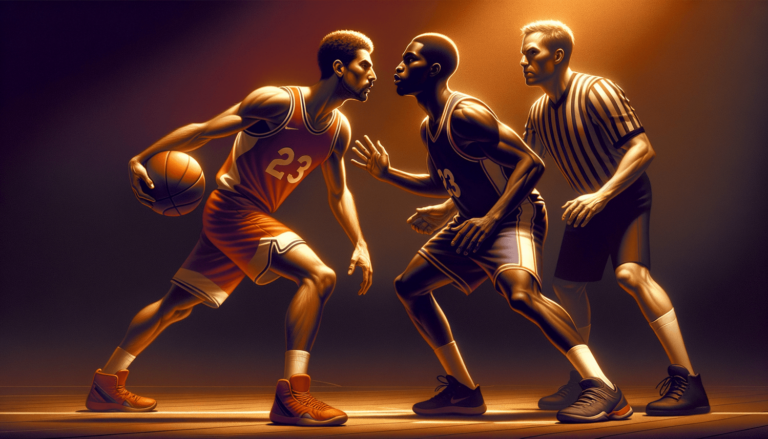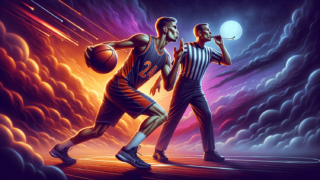
Unsportsmanlike Conduct Rule in Basketball
Written by: Basketball Universe
Last updated:

In the fast-paced and high-energy world of basketball, it’s no surprise that emotions can occasionally run high. With players and fans alike fiercely devoted to their teams, it’s essential to maintain a level of sportsmanship that keeps the game not only competitive but also respectful. Enter the Unsportsmanlike Conduct Rule! This fundamental regulation is designed to ensure fair play and uphold the integrity of the sport. So whether you’re a die-hard basketball enthusiast or an eager newcomer wanting to learn the ins and outs of the game, join us as we delve into the intricacies of this rule, unpack its significance, and explore how it impacts the game we all love.
Unsportsmanlike Conduct Rule in Basketball
The Unsportsmanlike Conduct Rule in basketball is a set of guidelines that promotes fair play, respect, and good sportsmanship among players, coaches, and officials during a game. This rule aims to prevent any behavior that negatively affects the spirit of the game, such as taunting, profanity, excessive physical contact, and other disrespectful actions. Violations of this rule typically result in penalties, ranging from personal or technical fouls to ejections and suspensions, depending on the gravity of the conduct.
Defining Unsportsmanlike Conduct in Basketball
Before diving into the intricacies of the Unsportsmanlike Conduct Rule, it’s essential to have a clear understanding of what constitutes unsportsmanlike conduct in basketball. In general, unsportsmanlike conduct refers to any actions or behavior that go against the spirit of the game, disrespect the opponents, teammates, coaches, or officials, or otherwise create a hostile playing environment. Here are some common examples of unsportsmanlike conduct:
- Taunting or trash-talking opponents
- Using profanity, slurs, or offensive gestures
- Fighting, flagrant fouls, or excessive physical contact
- Disrespecting the decisions of game officials
- Intentionally delaying the game
It is important to note that while unsportsmanlike conduct can include various actions and behaviors, the context and intention of the actions play a significant role in determining a violation of basketball rules. Generally, actions that are purposely disruptive, disrespectful, or unsporting are considered unsportsmanlike.
Types of Penalties for Unsportsmanlike Conduct
The penalties for unsportsmanlike conduct in basketball vary depending on the severity and nature of the action. Common penalties include personal fouls, technical fouls, ejections, and suspensions. Let’s take a closer look at each of these penalties:
Personal Fouls
A personal foul is a standard penalty in basketball, typically assessed for illegal physical contact between players. In some cases, unsportsmanlike conduct may lead to a personal foul, such as when an offensive player pushes or elbows a defensive player without the ball. The opposing team is awarded free throws or the ball, depending on the specific situation and league rules.
Technical Fouls
Technical fouls are specifically reserved for unsportsmanlike conduct and other violations that do not involve physical contact between players. The most common examples of technical fouls include taunting, using profanity, or arguing with referees. A technical foul generally results in free throws for the opposing team, as well as the possession of the ball.
Flagrant Fouls
Flagrant fouls are a more severe type of personal foul and are assessed when a player commits an unsportsmanlike act involving excessive or unnecessary contact. Flagrant fouls can be divided into two categories: Flagrant 1 and Flagrant 2. A Flagrant 1 foul is called for contact that is deemed unnecessary, while a Flagrant 2 foul is called for contact that is both unnecessary and excessive. Both types of flagrant fouls result in free throws for the opposing team, possession of the ball, and the possibility of the offending player receiving a suspension or fine.
Ejections
In extreme cases of unsportsmanlike conduct, a player or coach may be ejected from the game. Ejections typically occur after accumulating multiple technical fouls, committing a Flagrant 2 foul, or engaging in particularly egregious actions such as fighting. An ejected player or coach must leave the court immediately and is often subject to further disciplinary action, such as fines or suspensions.
Suspensions
Suspensions are an additional penalty for particularly severe instances of unsportsmanlike conduct or repeated violations of basketball rules. Players or coaches can be suspended for a specific number of games or indefinitely, depending on the situation. Suspensions are typically handed down by the league or governing body after a thorough review of the incident.
Unsportsmanlike Conduct and Team Dynamics
It’s important to recognize that unsportsmanlike conduct not only impacts the offending player or coach but also has significant consequences for the entire team. The loss of a player due to ejection or suspension can disrupt team chemistry, reduce on-court performance, and negatively impact morale. Furthermore, teams that consistently accumulate technical fouls or other unsportsmanlike penalties can develop a reputation for poor sportsmanship, which may damage their relationships with other teams, officials, and fans.
Preventing Unsportsmanlike Conduct
While the competitive nature of basketball can sometimes lead to heightened emotions and unsportsmanlike conduct, there are strategies that players, coaches, and officials can employ to promote good sportsmanship and prevent negative actions on the court. Below are some approaches that can help foster a positive and respectful basketball environment:
Lead by Example
Players and coaches can set the tone for good sportsmanship by demonstrating respectful behavior towards opponents, teammates, and officials. By modeling positive behavior and holding themselves accountable, team leaders can create a culture that values sportsmanship and reduces the likelihood of unsportsmanlike conduct.
Encourage Open Communication
Providing a forum for players and coaches to openly discuss their emotions, thoughts, and concerns can help to prevent unsportsmanlike conduct. By fostering open communication, teams can work together to address any issues that may arise and develop strategies to manage emotions in a more constructive manner.
Educate on the Rules
Understanding the nuances of the Unsportsmanlike Conduct Rule and other basketball rules is critical for preventing violations. Players and coaches should be familiar with the specific actions that constitute unsportsmanlike conduct and the potential penalties they may face. This knowledge can help to guide behavior and reduce the likelihood of incurring penalties during a game.
Teach Conflict Resolution Skills
Developing conflict resolution skills can be particularly valuable in preventing unsportsmanlike conduct. By learning to manage emotions, communicate effectively, and find compromises, players and coaches can address on-court disputes and disagreements without resorting to disrespectful or unsporting behavior.
Monitor and Address Behavior
Coaches and team captains should be vigilant in monitoring the behavior of their players and addressing any instances of unsportsmanlike conduct. Staying proactive in identifying and correcting inappropriate behavior can help to maintain a positive team environment and prevent more serious consequences down the road.
Unsportsmanlike Conduct in Different Basketball Leagues
While the Unsportsmanlike Conduct Rule is a staple of basketball rules worldwide, it’s essential to recognize that specific interpretations, penalties, and enforcement practices may differ depending on the league or governing body overseeing the game. Some of the most popular basketball leagues or tournaments include:
- National Basketball Association (NBA)
- International Basketball Federation (FIBA)
- National Collegiate Athletic Association (NCAA)
- Women’s National Basketball Association (WNBA)
Each of these organizations may have its own unique definitions, penalties, and ways of enforcing the Unsportsmanlike Conduct Rule. As a result, it’s important for players, coaches, officials, and fans to familiarize themselves with the specific rules governing their league of interest.
The Impact of Unsportsmanlike Conduct on the Game
While the Unsportsmanlike Conduct Rule may seem like a small aspect of basketball, its impact on the overall game is profound. The enforcement of this rule helps to maintain a sense of fairness, respect, and integrity that is essential for preserving the spirit of the game. By promoting good sportsmanship and discouraging negative behavior, the Unsportsmanlike Conduct Rule keeps the focus on the thrilling competition and skill that make basketball such an exciting and enjoyable sport for players and fans alike.
Role of Referees and Officials in Enforcing the Unsportsmanlike Conduct Rule
Referees and officials play an essential role in enforcing the Unsportsmanlike Conduct Rule during basketball games. As the gatekeepers of the game’s integrity, they are responsible for monitoring players’ actions and ensuring that unsportsmanlike conduct is appropriately addressed. In this section, we will explore some of the key responsibilities and challenges that referees and officials face in enforcing this critical rule:
Maintaining Objectivity
One of the primary challenges referees and officials face in enforcing the Unsportsmanlike Conduct Rule is maintaining objectivity. As human beings, it’s natural for referees to have personal biases; however, it’s crucial that they set these aside when officiating a game. To ensure fairness and impartiality, referees must evaluate all players’ behavior and actions fairly and consistently, regardless of their personal feelings or connections to the teams involved.
Consistent Decision-Making
In order to preserve basketball’s integrity and the spirit of the game, referees and officials must apply the Unsportsmanlike Conduct Rule consistently throughout a game and between games. This consistency helps to establish clear expectations for players and coaches regarding what actions will be penalized and ensures a level playing field for all participants.
Deescalating Conflicts
Emotions can sometimes run high during a competitive basketball game, and tempers may flare between players, coaches, and even fans. Referees and officials must possess the ability to deescalate conflicts and prevent situations from escalating into unsportsmanlike conduct or physical altercations. This may involve issuing warnings, assessing technical fouls, or separating players to calm the situation.
Adapting to League-Specific Rules
As discussed earlier, different basketball leagues may have their own specific interpretations and penalties related to the Unsportsmanlike Conduct Rule. Referees and officials must stay up-to-date on these rules and be prepared to adapt their enforcement practices accordingly when officiating games in different leagues or tournaments.
The Impact of Sportsmanship on Player Development
While the Unsportsmanlike Conduct Rule plays a significant role in maintaining an enjoyable and fair playing environment at the professional level, the importance of good sportsmanship extends far beyond the world of professional basketball. Encouraging sportsmanship and discouragement of unsportsmanlike conduct at the youth and amateur level is essential for the development of well-rounded athletes and, ultimately, more successful and respectful professional players.
Character Development
Practicing good sportsmanship instills important values such as respect, humility, and teamwork in young athletes. By emphasizing these values, coaches, parents, and teammates can help to shape players’ character, not only on the basketball court but also in their everyday lives.
Improved Teamwork And Collaboration
A culture of sportsmanship fosters an environment in which players are more willing to collaborate and support one another. These positive team dynamics can lead to better overall performance, as players learn to work together in pursuit of a common goal. In addition, players who consistently demonstrate sportsmanship tend to be more coachable, resulting in improved individual development as well.
Greater Enjoyment Of The Game
Sportsmanship-focused environments make for more enjoyable experiences for everyone involved in the game, including players, coaches, officials, and fans. By promoting respect and fairness, games become less contentious, and participants can appreciate the true spirit of competition and camaraderie that sports provide.
Setting The Stage For Future Success
Players who develop strong sportsmanship skills at a young age are more likely to carry these values with them as they progress through their basketball careers. Whether they are skilled enough to play at the collegiate or professional level or choose to remain involved in recreational leagues, athletes with a strong foundation in sportsmanship will contribute positively to the game’s overall development and enjoyment.
In Conclusion
From understanding the importance of the Unsportsmanlike Conduct Rule and promoting good sportsmanship to acknowledging the role of referees, it’s clear that enforcing sportsmanship is essential to preserving the integrity of basketball. By actively preventing unsportsmanlike conduct and fostering a culture of respect, players, coaches, and officials can contribute to a more enjoyable and fair game experience for all involved. With a true understanding of the importance of sportsmanship, the future of the game remains bright, rewarding, and enjoyable for everyone!
Frequently Asked Questions
In this FAQ section, we will address some of the most common questions related to the Unsportsmanlike Conduct Rule in basketball. From defining unsportsmanlike conduct to understanding its impact on players and coaches, we’ll cover essential topics to help you gain a deeper understanding of the concept of sportsmanship in the game.
1. What is considered unsportsmanlike conduct in basketball?
Unsportsmanlike conduct in basketball refers to any actions or behavior that violate the spirit of the game, disrespect opponents, teammates, coaches, or officials, or create a hostile playing environment. Examples include taunting, using profanity, fighting, excessive physical contact, and intentionally delaying the game.
2. What are the penalties for unsportsmanlike conduct in basketball?
The penalties for unsportsmanlike conduct vary depending on the severity of the action. They may include personal fouls, technical fouls, flagrant fouls, ejections, or suspensions. Each penalty carries specific consequences, such as awarding free throws to the opposing team or the loss of a player due to ejection or suspension.
3. How do referees enforce the Unsportsmanlike Conduct Rule?
Referees enforce the Unsportsmanlike Conduct Rule by objectively monitoring players’ actions throughout the game and addressing unsportsmanlike conduct with appropriate penalties. They must consistently apply the rule and deescalate conflicts, as well as adapt their enforcement practices to league-specific rules when necessary.
4. Are the rules for unsportsmanlike conduct the same across different basketball leagues?
While the Unsportsmanlike Conduct Rule is a fundamental basketball rule worldwide, specific interpretations, penalties, and enforcement practices may differ depending on the league or governing body. Players, coaches, officials, and fans should familiarize themselves with the specific rules governing their league of interest to ensure a proper understanding of the game’s expectations and requirements.
5. How can players and coaches promote good sportsmanship within their team?
Players and coaches can promote good sportsmanship by leading by example, encouraging open communication, educating on the rules, teaching conflict resolution skills, and proactively monitoring and addressing behavior. Creating a culture that values sportsmanship helps prevent unsportsmanlike conduct and fosters a positive basketball environment.
6. What is the difference between a technical foul and a flagrant foul?
A technical foul is a penalty reserved for unsportsmanlike conduct or violations that do not involve physical contact between players, such as arguing with a referee. A flagrant foul, on the other hand, is assessed for unsportsmanlike acts involving excessive or unnecessary contact. Flagrant fouls are categorized as Flagrant 1 (unnecessary contact) or Flagrant 2 (unnecessary and excessive contact), with each carrying specific consequences.
7. Can fans be penalized for unsportsmanlike conduct?
While fans are generally not subject to the same penalties as players and coaches, they can still face consequences for unsportsmanlike conduct. Depending on the severity of the actions, fans may be removed from the arena, banned from future games, or subject to legal action if their behavior violates local laws or regulations.
8. How does promoting sportsmanship at the youth level impact player development?
Promoting sportsmanship at the youth level helps young athletes develop important values such as respect, humility, and teamwork. Emphasizing sportsmanship fosters improved teamwork and collaboration, greater enjoyment of the game, and better preparation for future success in basketball and beyond.
9. What can referees and officials do to mitigate their biases when enforcing the Unsportsmanlike Conduct Rule?
Referees and officials can mitigate their biases through training and practice, focusing on objectively evaluating players’ actions and behavior, and consistently applying the rules regardless of personal feelings or connections. The goal is to remain impartial and ensure a fair, level playing field for all participants.
10. Can a player’s unsportsmanlike conduct have long-term consequences for their career?
Yes, a player’s unsportsmanlike conduct can have long-term consequences for their career. Repeated violations, suspensions, or ejections may damage a player’s reputation, hinder their ability to form positive relationships with teammates and coaches, and ultimately impact their professional opportunities. Good sportsmanship is crucial for success both on and off the court.
Featured Posts
- No pillar pages found.





